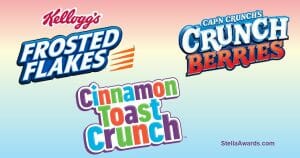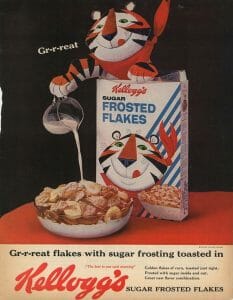Stella Case No. 091, Originally Published: 29 June 2005
Americans are not only ballooning in weight, diabetes is practically becoming epidemic. A small but growing segment of consumers is finally starting to look for foods with less or no trans fats, less sugar, less processing. Food manufacturers are taking notice, and are starting to respond to those consumer demands.
One such market segment is breakfast cereals. Kraft foods, Kellogg, and General Mills have long offered such high-sugar cereals. Finally, they have introduced cereals with reduced sugar, including Cocoa Puffs, Cinnamon Toast Crunch, and Trix (from General Mills); Frosted Flakes and Froot Loops (from Kellogg); and Fruity Pebbles (from Post). “Less” sugar in such sugar-laden cereals may not exactly be great, but they’re a start.

Jennifer Hardee of San Diego, Calif., says she bought the cereals for her daughters, aged 10 and 13, because she “believed” they were healthier for her girls. But then she heard a news report on the radio that the cereals were not particularly nutritious and she “became alarmed.”
It’s unclear whether she bothered to read the nutritional information mandated by law to be printed on the packages before she bought the cereals, or even before she went running to a lawyer: she sued the three companies in Superior Court in San Diego. The suit, prepared by Hardee’s lawyer, Hal Hewell, seeks class action status to include all consumers in the state who bought the cereals.
“There really is no net health benefit” to the reduced sugar, Hewell says, because the sugar is replaced by other refined carbohydrates, “but it appears to the parents buying the cereal that there is.”
Where, exactly, did these “beliefs” and “appearances” come from? The cereal companies don’t claim there are fewer calories in the low-sugar varieties — just less sugar.
Indeed, says a spokeswoman from General Mills, the company “never made specific health claims” for the new cereals. “Consumers wanted less sugar, so we gave them less sugar,” she said. “Our packaging is clearly labeled with nutritional information that complies” with labeling laws.
A spokeswoman for Post agrees, “There are some consumers who prefer an option with reduced sugar. And we’re looking to see if there are ways to add additional nutrients like whole grain and fiber in the future,” she said. “It’s a process that takes time.”
Not good enough, Hardee says. “It’s deceiving,” she complains. “Parents think they’re buying something healthier for their children, [only] to find out that they’re not.”
Hardee could have been an informed consumer and actually read the information on the packages. Or, better, she could have compared the information on the low-sugar varieties with their full-sugar counterparts and would have quickly seen that they had little if any benefit. That way she wouldn’t have to rely on assumptions, advertising implications, or hearsay.
But no: she instead just “believed” the cereals were better and, when her foolish assumptions turned out to be wrong, she chose to drag the companies into court, rather than point the finger at who was really to blame: herself. Rather than encouraging the companies to improve, her actions actively discourage them from even attempting to make better products.
If she wants nutritious meals for her kids, she needs to look beyond manufactured carbohydrate-based foods. But then, that would require her to read and apply reason, wouldn’t it?
Sources
- “‘Low Sugar’ Claim Called Misleading”, San Diego Union-Tribune, 29 March 2005.
- “Woman Sues Over ‘Deceiving’ Cereal Labels”, ABC News, 30 March 2005.
Case Status
Remarkably, for such a high-profile case I found no conclusion after about an hour searching in various ways. But I found some other interesting stuff, as noted in the next section.
I have to assume it was quietly settled for a small payment, or tossed out. The suit sought “forfeiture of all the profits from the cereals in addition to an order stopping the companies from promoting the cereals as ‘low sugar’,” and that sure as hell never happened.
My 2021 Thoughts on the Case
Attorney Harold Hewell was quite the cereal litigator: he also represented San Francisco Bay Area resident Roy Werbel, who sued two cereal-makers because he figured Kellogg’s Froot Loops had real froot …er, fruit, in it. That and the “berries” in Quaker Oats’ Cap’n Crunch Crunchberries cereal. That burst of palate-shredding sweetness that stays crunchy (even in milk!) isn’t from actual berries?! Who could have possibly known that?!

The case against Kellogg was apparently never actually filed, but the Quaker Oats case made it to a judge.
In 2010, Judge Saundra Brown Armstrong of the U.S. District Court for the Northern District of California (that’s right: they were federal lawsuits!) threw Werbel and Hewell out with prejudice: the case was “nonsense,” she declared. Well that’s kinda harsh, don’tcha think? “It’s not that I agree with it, but I respect her decision,” Hewell said after the boot. “We felt she analyzed it and resolved any issues we had about the viability of the case.” Snort! Ya think?!
I particularly like the highlighted word in this Wikipedia sentence: “There are currently four Crunch Berry colors: red, green, blue, and purple. All the berry pieces are flavored the same, regardless of color.” Right: they’re not flavors, they’re colors, let alone not froot. Uh, fruit.
But that’s not all! Hewell had earlier also represented Janice Sugawara, filing a suit with the exact same theory: that “crunchberries” are not … actual … berries.
“The survival of the instant claim would require this Court to ignore all concepts of personal responsibility and common sense,” said U.S. District Court for the Eastern District of California Morrison C. England Jr. in his 2009 ruling, slapping the idea even harder than Judge Brown. “The Court has no intention of allowing that to happen.”
Yet Hewell joined another similar action around the same time?!
The only surprise is that he hasn’t sued Post because Grape Nuts is devoid of both grapes and nuts, despite the allegedly legally binding name of the stuff.
Yeah, I was a little over the top on this page; I blame it on having huckleberry ice cream for breakfast. But I did my research: huckles are not only real berries, they’re Grrrrreat!
Letters
The Case of a Victim vs. the Phonebook:
David in California, says: “First of all, it’s bad enough that they were able to find enough jurors that were stupid enough to think that the Dex Yellow Pages should be liable for every ad that appears in its book. How many ads do they print? How many extra employees would they have to hire to investigate EVERY claim in EVERY SINGLE AD? I can’t imagine a phone book printer would be able to stay in business under those conditions. And yet that seems to be the precedent that has been set here. So now either they will have to raise their advertising rates (which will no doubt be passed onto the consumer in the form of higher prices), or they will have to charge a subscription fee to receive their phone book. So we’re all going to be paying off ridiculous lawsuits such as this (and the others that will no doubt follow) one way or another.”
I probably agreed at the time, but as noted with the case, the Stella Award was overturned because Dex did know the ad was false before publication.
- - -
Email Subscriptions
No new cases are being published, so please don’t try to submit cases.
My Flagship Email Publication This is True continues to come out with new stories every week. It’s “Thought-Provoking Entertainment” like Stella, but uses weird-but-true news items as its vehicle for social commentary. It is the oldest entertainment newsletter online — weekly since 1994. Click here for a This is True subscribe form.

I wondered as a child if JH Kellogg would’ve been happy with what corn flakes became. And i wanted to do a survey to see if real Quakers still use real oats. Then i grew up and realized advertisers & corporations have different ethics altogether.
WOT no grapes or nuts in Grape Nuts, my life wil never be the same again!
You do know that image up there is Oreo O’s, not Crunchberries?
—
Well that’s amusing! I replaced the image (and caption) 10 days ago …but the old image was cached. I “fixed it” by turning off the image cache. -rc
I’m not sure if it’s the same case, but I just “participated” in a class action suit involving sugared cereals. I got something like a whopping $2.11 for buying cereal and filling out their form, or less than the cost of a box of brand-name cereal.
—
Haven’t heard of the case, but I’ll bet the lawyers involved got at least 6 figures. -rc
Years ago I filled out all the forms (because why not?) for a class-action suit against eBay for, I think, not properly disclosing fees or something. Many months later I got a check for $0.01.
They mailed me
a printed check
for a penny.
I didn’t cash it, of course; I still have it. May frame it one day.
I had a company send me a bill every month for 15 months for $ .23. It was “supposedly” an adjustment of my last bill. Even at their discounted postal rate, they paid $ 6-7 to collect it. Then what? Send it to Collections?
If {Bill} < {Stamp} = [NO PRINT]
Twenty years ago, Blockbuster (remember them?) was sued over the collection of late fees. It was a stupid lawsuit, one that should have been thrown out on the first day.
Instead, Blockbuster negotiated a settlement. The settlement? Everyone in the class got….a coupon….for a rental at Blockbuster. The only people that got anything were the class action attorneys, but they were paid less than Blockbuster would have paid their own attorneys to win the case.
It was such a monumentally good deal for Blockbuster, and bad for the customers, that I had gone to work for their competition at around the same time, and we sent out our own coupons (and I even heard people claiming “we lost the lawsuit, too”) just to keep up with them.
It was also incredibly short-sighted, and did not help Blockbuster in the long run. Just like almost every other decision they made at that time.
I had to laugh out loud at the line “Hewell had earlier also represented Janice Sugawara”.
In Tok Pisin (the proper name for pidgin English) sugawara means soft-drink. From suga meaning sugar and wara meaning water. Sodawara means sea water.
Just how stupid do you have to be in order to believe that “less sugar” means “no sugar”?
I think the answer is “almost as stupid as a lawyer who’d file a case based on that assumption”.